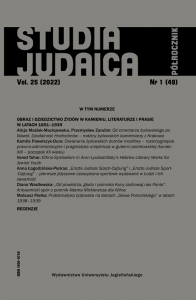„Od powietrza, głodu i pomnika Kuny zachowaj nas Panie”. Antysemicki spór o pomnik Adama Mickiewicza dla Wilna
“From Air, Hunger, and the Monument by Kuna Protect Us, Lord”: The Antisemitic Dispute over the Adam Mickiewicz Monument for Vilnius
Author(s): Diana WasilewskaSubject(s): Jewish studies
Published by: Wydawnictwo Uniwersytetu Jagiellońskiego
Keywords: antisemitism; art criticism; Polish interwar art; national art;
Summary/Abstract: After Poland regained independence in 1918, a considerable group of Polish Jews wanted to co-create Polish culture, which did not find approval in the eyes of nationalists, defenders of the purity of national culture. Writers and artists of Jewish origin, especially those assimilated, became the main target of attacks and victims of social ostracism. The story of the monument of Adam Mickiewicz proposed to the city of Vilnius by Henryk Kuna, a sculptor with Jewish roots, may serve as a case study, perfectly illustrating both the power of resentment among the broad masses of society at the time and the influence of journalists. Kuna’s project was the third (after Zbigniew Pronaszko’s avant-garde monument and Stanisław Szukalski’s symbolist one) project of a Mickiewicz monument for Vilnius, selected in a competition in 1932. Unlike the previous ones, it did not seem to be controversial either in terms of form (it represented modernized classicism) or symbolism (it showed the poet in a pilgrim’s cloak with a book in one hand, the other hand covering his eyes). Despite this, nationalist circles unleashed an antisemitic campaign, striking at both the artistic and iconographic value of the statue. A rich variety of rhetorical means, from wit to virulent mockery, prove that it was not aesthetic preferences that played a dominant role here, but Henryk Kuna’s background, which influenced the evaluation and interpretation of his work.
Journal: Studia Judaica
- Issue Year: 25/2022
- Issue No: 49
- Page Range: 133-160
- Page Count: 28
- Language: Polish

